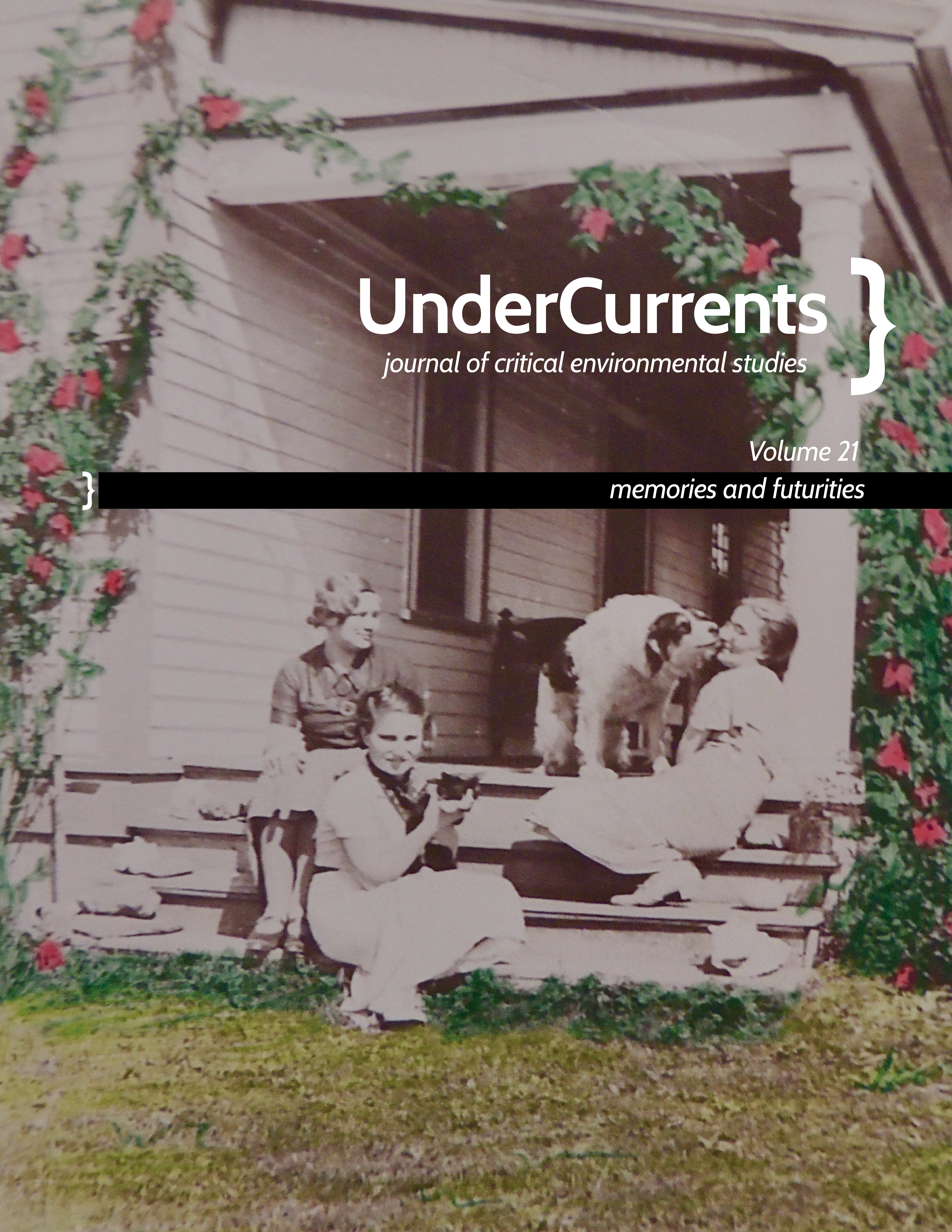Storying Futures of the Always-Already Extinct
Challenging Human Exceptionalism; Exploring Animal Survivance
DOI:
https://doi.org/10.25071/2292-4736/40296Keywords:
extinction, human exceptionalism, animal futurity, animal agency, (Indigenous) survivanceAbstract
This paper contends that anthropogenic mass extinction cannot be overcome via discourses that only humans can prevent extinctions: such discourses uphold problematic assumptions of human exceptionalism. This paper takes up Gerald Vizenor’s concept of survivance, which upholds Indigenous futures and speaks of Indigenous peoples’ continuous agential survival against settler colonialism, to challenge human exceptionalism, assert animal agency, and envision transformative futures where all animals―human and nonhuman―might survive with ethics and justice.
References
Abram, David. The Spell of the Sensuous: Perception and Language in a More-Than-Human World. 1996. Vintage Books, 1997.
Agamben, Giorgio. The Open: Man and Animal. 2002. Translated by Kevin Attell, Stanford UP, 2004.
Belcourt, Billy-Ray. “Animal Bodies, Colonial Subjects: (Re)Locating Animality in Decolonial Thought.” Societies, vol. 5, no. 1 2015, pp. 1-11. DOI: https://doi.org/10.3390/soc5010001
Blade Runner. Directed by Ridley Scott, Warner Bros., 1982.
Byrd, Jodi A. The Transit of Empire: Indigenous Critiques of Colonialism. U of Minnesota P, 2011. DOI: https://doi.org/10.5749/minnesota/9780816676408.001.0001
Calarco, Matthew. Thinking Through Animals: Identify, Difference, Indistinction. Stanford UP, 2015. DOI: https://doi.org/10.1515/9780804796538
Cheney, Jim, and Anthony Weston. “Environmental Ethics as Environmental Etiquette: Toward an Ethics-Based Epistemology.” Environmental Ethics, vol. 21, no. 2, 1999, pp. 115–134. DOI: https://doi.org/10.5840/enviroethics199921226
Coulthard, Glen Sean. Red Skin, White Masks: Rejecting the Colonial Politics of Recognition. U of Minnesota P, 2014. DOI: https://doi.org/10.5749/minnesota/9780816679645.001.0001
de Waal, Frans. Chimpanzee Politics: Power and Sex Among Apes. 25th anniversary ed., John Hopkins UP, 2007. DOI: https://doi.org/10.56021/9780801886560
Engel, Jordan. "Pine Ridge Reservation in Lakota." The Decolonial Atlas, 20 Mar. 2016, https://decolonialatlas.wordpress.com/2016/03/20/pine-ridge-in-lakota-no-2/. Accessed 13 Dec. 2017.
Gamber, John. “Tactical Mobility as Survivance: Bone Game and Dark River by Louis Owens.” Survivance: Narratives of Native Presence, edited by Gerald Vizenor, U of Nebraska P, 2008, pp. 221–245.
Hribal, Jason. Fear of the Animal Planet: The Hidden History of Animal Resistance. CounterPunch and AK Press, 2010.
King, Thomas. The Inconvenient Indian: A Curious Account of Native People in North America. Doubleday, 2012.
Kroeber, Theodora. Alfred Kroeber: A Personal Configuration. U of California P, 1970. DOI: https://doi.org/10.1525/9780520323131
Lockard, Joe. “Facing the Wiindigoo: Gerald Vizenor and Primo Levi.” Survivance: Narratives of Native Presence, edited by Gerald Vizenor, U of Nebraska P, 2008, pp. 209–219.
Mad Max: Fury Road. Directed by George Miller, Warner Bros., 2015.
Massumi, Brian. What Animals Teach Us About Politics. Duke UP, 2014. DOI: https://doi.org/10.1515/9780822376057
Monkman, Kent. Shame and Prejudice: A Story of Resilience: Excerpts from the Memoirs of Miss Chief Eagle Testickle. U of Toronto Art Centre, 2017.
Plumwood, Val. Environmental Culture: The Ecological Crisis of Reason. Routledge, 2002.
St. Clair, Jeffrey. “Let Us Now Praise Infamous Animals.” Fear of the Animal Planet: The Hidden History of Animal Resistance, by Jason Hribal. CounterPunch and AK Press, 2010, pp. 1–19.
Simonelli, Richard. “Tatanka Returns.” Winds of Change, vol. 8, no. 4, 1993, pp. 16–23.
Smith, Mick. “Ecological Community, the Sense of the World, and Senseless Extinction.” Environmental Humanities, vol. 2, no. 1, 2013, pp. 21–41. DOI: https://doi.org/10.1215/22011919-3610333
Timmins, Tracy. Animal agency and its ethical and political implications. 2017. TS. Author’s private collection.
Tuck, Eve. “Suspending Damage: A Letter to Communities.” Harvard Educational Review, vol. 79, no. 3, 2009, pp. 409–427. DOI: https://doi.org/10.17763/haer.79.3.n0016675661t3n15
Vaillant, John. The Tiger: A True Story of Vengeance and Survival. Vintage Canada, 2011.
Velie, Alan. “The War Cry of the Trickster: The Concept of Survivance in Gerald Vizenor’s Bear Island: The War at Sugar Point.” Survivance: Narratives of Native Presence, edited by Gerald Vizenor, U of Nebraska P, 2008, pp. 147–162.
Veracini, Lorenzo. Settler Colonialism: A Theoretical Overview. Palgrave Macmillan, 2010. DOI: https://doi.org/10.1057/9780230299191
Vizenor, Gerald. “Aesthetics of Survivance: Literary Theory and Practice.” Survivance: Narratives of Native Presence, edited by Gerald Vizenor, U of Nebraska P, 2008, pp. 1–23.
Vizenor, Gerald. Fugitive Poses: Native American Indian Scenes of Absence and Presence. U of Nebraska P, 1998.
Vizenor, Gerald. Hiroshima Bugi: Atomu 57. U of Nebraska P, 2003.
Vizenor, Gerald. Manifest Manners: Postindian Warriors of Survivance. Wesleyan UP, 1994.
Vizenor, Gerald, and A. Robert Lee. Postindian Conversations. U of Nebraska P, 1999.
Wildlife Conservation Society. "Bison." Wildlife Conservation Society North America, n.d., https://northamerica.wcs.org/Wildlife/Bison.aspx. Accessed 16 Jan. 2018.
Willett, Cynthia. Interspecies Ethics. Columbia UP, 2014. DOI: https://doi.org/10.7312/will16776
Downloads
Published
How to Cite
Issue
Section
License
Copyright (c) 2022 UnderCurrents: Journal of Critical Environmental Studies

This work is licensed under a Creative Commons Attribution 4.0 International License.
Creators retain copyright for all writings and artwork published in UnderCurrents. New material published as of Volume 21 (2022) is available under a Creative Commons Attribution 4.0 International License (CC-BY 4.0).


